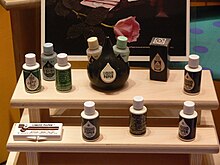
Liquid Paper is an American brand of the Newell Brands company marketed internationally that sells correction fluid, correction pens, and correction tape. Mainly used to correct typewriting in the past, correction products now mostly cover handwriting mistakes.
Product history

In 1956, Bette Nesmith Graham (mother of future Monkees guitarist Michael Nesmith) invented the first correction fluid in her kitchen. Working as a typist, she used to make many mistakes and always strove for a way to correct them. Starting on a basis of tempera paint she mixed with a common kitchen blender, she called the fluid "Mistake Out" and started to provide her co-workers with small bottles on which the brand's name was displayed.
By 1958, Graham founded the Mistake Out Company and continued working from her kitchen (and eventually garage) nights and weekends to produce small batches of correction bottles. She was fired from her typist job as executive secretary at Texas Bank and Trust after she accidentally put her own company’s name on a sheet of her employer’s company letterhead. She subsequently decided to devote all her time to Mistake Out.
Graham offered her correction fluid to IBM, which declined the offer (the company announced its own Correcting Selectric with an integrated lift-off tape in 1973). By 1968, the product – now renamed Liquid Paper – was profitable, and in 1979 the company was sold to the Gillette Corporation for $47.5 million with royalties.
Acquisition
In 2000, the Liquid Paper product and brand name was acquired by Newell Rubbermaid (now Newell Brands). In some regions of the world, Liquid Paper is now endorsed by Papermate, a widely known writing instruments brand (also owned by Newell).
Ingredients

As of 2009 MSDSs list Liquid Paper as containing titanium dioxide, solvent naphtha, mineral spirits, resins, dispersant, and fragrances.
Liquid Paper came under scrutiny in the 1980s, due to concerns over recreational sniffing. The organic solvent 1,1,1-trichloroethane (TCA) was used as a thinner in the product. Liquid Paper containing TCA was thought to be toxic and carcinogenic, but later studies showed that although the thinner was toxic there was no evidence of carcinogenicity. There were several studies linking fatalities to the TCA contained in correction fluids, including Liquid Paper.
In 1989, Gillette reformulated Liquid Paper without TCA, in response to a complaint under California Proposition 65.
See also
References
- Blattman, Elissa (2013), Three Every-day Items Invented by Women, National Women's History Museum
- "Bette Nesmith Graham" (PDF). Celebrating Texas. Retrieved 2010-03-18.
- "Paper Mate Liquid Paper Fast Drying Correction Fluid" (PDF). MATERIAL SAFETY DATA SHEET - MSDS #: 56401. Sanford NA. 2003. Archived from the original (PDF) on 2012-02-27. Retrieved 2009-08-18.
- "Liquid Paper Correction Fluid, White. Material Safety Data Sheet". Ohio State University College of Biological Sciences. 1 January 1985. Archived from the original on 21 June 2010.
- Sullivan, John Burke; Krieger, Gary R. (2001). Clinical environmental health and toxic exposures. Philadelphia: Lippincott Williams & Wilkins. p. 497. ISBN 978-0-683-08027-8. OCLC 41606485.
Trichloroethane generally is less toxic than methylene chloride ... is not teratogenic and carcinogenicity and mutagenicity testing has proven inconclusive.
- King, Gregory S.; Smialek, John E.; Troutman, William G. (15 March 1985). "Sudden Death in Adolescents Resulting From the Inhalation of Typewriter Correction Fluid". JAMA: The Journal of the American Medical Association. 253 (11): 1604–6. doi:10.1001/jama.253.11.1604. PMID 3974043.
We describe four cases of sudden death in adolescents associated with recreational sniffing of typewriter correction fluid occurring during the period 1979 through mid-1984.
- D'costa, DF; Gunasekera, NP (August 1990). "Fatal cerebral oedema following trichloroethane abuse". Journal of the Royal Society of Medicine. 83 (8): 533–534. doi:10.1177/014107689008300823. PMC 1292788. PMID 2231588.
- Paddock, Richard C. (29 September 1989). "Gillette Agrees to Remove Toxics From Its Paper Correction Fluid". Los Angeles Times. Sacramento. Archived from the original on 15 July 2012. Retrieved 23 July 2009.
- Estrin, Norman F.; Akerson, James M. (2000). "Proposition 65". Cosmetic regulation in a competitive environment. New York, New York: Marcel Dekker. p. 138. ISBN 978-0-8247-7516-2. Retrieved 23 July 2009.
Gillette agreed to reformulate the product so that it would not pose a risk requiring a Proposition 65 warning
External links
- Newell Rubbermaid official website
- Papermate US website
- Official Web site
- Liquid Paper on inventors.about.com